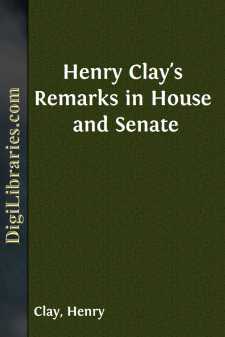Categories
- Antiques & Collectibles 13
- Architecture 36
- Art 48
- Bibles 22
- Biography & Autobiography 813
- Body, Mind & Spirit 142
- Business & Economics 28
- Children's Books 15
- Children's Fiction 12
- Computers 4
- Cooking 94
- Crafts & Hobbies 4
- Drama 346
- Education 46
- Family & Relationships 57
- Fiction 11829
- Games 19
- Gardening 17
- Health & Fitness 34
- History 1377
- House & Home 1
- Humor 147
- Juvenile Fiction 1873
- Juvenile Nonfiction 202
- Language Arts & Disciplines 88
- Law 16
- Literary Collections 686
- Literary Criticism 179
- Mathematics 13
- Medical 41
- Music 40
- Nature 179
- Non-Classifiable 1768
- Performing Arts 7
- Periodicals 1453
- Philosophy 64
- Photography 2
- Poetry 896
- Political Science 203
- Psychology 42
- Reference 154
- Religion 513
- Science 126
- Self-Help 84
- Social Science 81
- Sports & Recreation 34
- Study Aids 3
- Technology & Engineering 59
- Transportation 23
- Travel 463
- True Crime 29
Henry Clay's Remarks in House and Senate
by: Henry Clay
Categories:
Description:
Excerpt
Part 1
Henry Clay, "On the Expunging Resolutions,"
U.S. Senate,
16 January 1837
Mr. President:
WHAT patriotic purpose is to be accomplished by this Expunging resolution? What new honor or fresh laurels will it win for our common country? Is the power of the Senate so vast that it ought to be circumscribed, and that of the President so restricted that it ought to be extended? What power has the Senate? None, separately. It can only act jointly with the other House, or jointly with the Executive. And although the theory of the Constitution supposes, when consulted by him, it may freely give an affirmative or negative response, according to the practice, as it now exists, it has lost the faculty of pronouncing the negative monosyllable. When the Senate expresses its deliberate judgment, in the form of resolution, that resolution has no compulsory force, but appeals only to the dispassionate intelligence, the calm reason, and the sober judgment, of the community. The Senate has no army, no navy, no patronage, no lucrative offices, no glittering honors, to bestow. Around us there is no swarm of greedy expectants, rendering us homage, anticipating our wishes, and ready to execute our commands.
How is it with the President? Is he powerless? He is felt from one extremity to the other of this vast Republic. By means of principles which he has introduced, and innovations which he has made in our institutions, alas! but too much countenanced by Congress and a confiding people, he exercises, uncontrolled, the power of the State. In one hand he holds the purse, and in the other brandishes the sword of the country. Myriads of dependants and partisans, scattered over the land, are ever ready to sing hosannas to him, and to laud to the skies whatever he does. He has swept over the government, during the last eight years, like a tropical tornado. Every department exhibits traces of the ravages of the storm. Take as one example the Bank of the United States. No institution could have been more popular with the people, with Congress, and with State Legislatures. None ever better fulfilled the great purposes of its establishment. But it unfortunately incurred the displeasure of the President; he spoke, and the bank lies prostrate. And those who were loudest in its praise are now loudest in its condemnation. What object of his ambition is unsatisfied? When disabled from age any longer to hold the sceptre of power, he designates his successor, and transmits it to his favorite! What more does he want? Must we blot, deface, and mutilate the records of the country, to punish the presumptuousness of expressing an opinion contrary to his own? What patriotic purpose is to be accomplished by this Expunging resolution? Can you make that not to be which has been? Can you eradicate from memory and from history the fact that in March, 1834, a majority of the Senate of the United States passed the resolution which excites your enmity? Is it your vain and wicked object to arrogate to yourselves that power of annihilating the past which has been denied to Omnipotence itself?...


